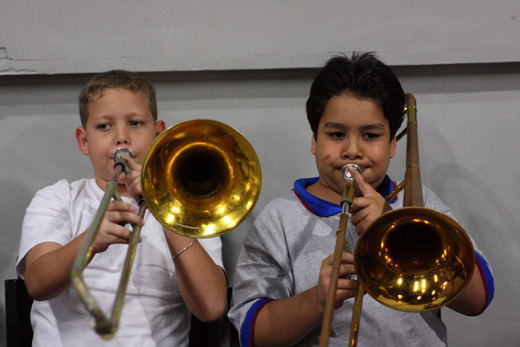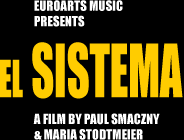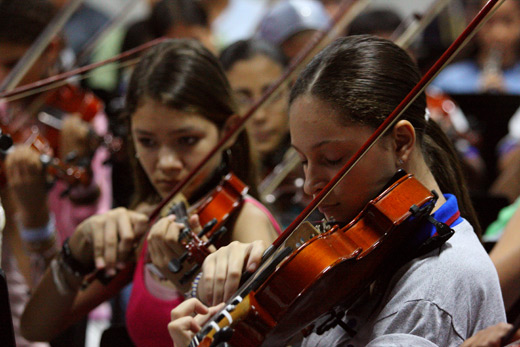
The Project
“Originally art was made by a minority for a minority. Then it became art by a minority for the majority, and now we are at the beginning of a new era, where art is intended by the majority for the majority.”
José Antonio Abreu
Astonishingly, in Venezuela classical music has been taken from its ivory tower of high culture, and placed in amongst real life. This is the result of a most improbable social project that has come to embrace all of Venezuelan society. 250,000 children and young adults are currently playing a musical instrument, and by 2010 these numbers will have doubled. It’s an astonishing development brought about by one person, first and foremost: José Antonio Abreu.
José Antonio Abreu is a conductor, composer and economist. 30 years ago he developed the idea of combining social work with classical music, in order to offer children from poor neighbourhoods an alternative to life on the streets. More than five million people live in the impromptu neighbourhoods of Caracas alone, half of whom are children. The settlers in these illegal suburbs have left their mark on the cityscape, and reflect the social reality: behind the glass palaces and banks, shacks made of red brick and boards crowd the slopes as far as the eye can see. Everyday life in the ‘barrios’ is marked by violence in the streets, corrupt police and gang warfare. Only a few find their way out of these circumstances: work is hard to come by even with vocational training, and the public schools do not adequately prepare students for university entrance exams. These structures create a system of poverty, social exclusion and poor prospects.
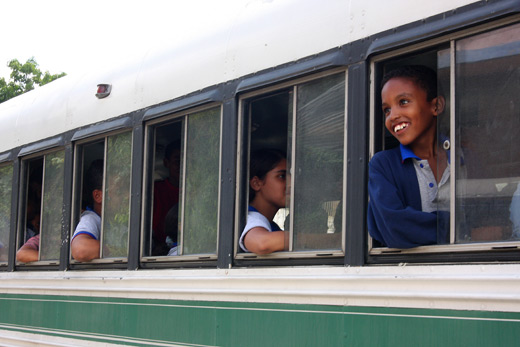
José Antonio Abreu wanted to break through this cycle of poverty, and in 1975 he established the first Venezuelan youth orchestra in Caracas with 12 children from the barrios. Since then he has built up a network of orchestras and music centres through the whole country. The same unique teaching methods are used in all of them. According to his approach, musical perfection is not the first priority; instead, from the first day on, what’s important is being able to play together with others. The children are integrated into orchestras from the very beginning, and the older children pass their knowledge down to the younger ones. Abreu’s intention and philosophy is concealed behind this simple concept: for him an orchestra is first and foremost about togetherness, a place where children learn to listen to each other and to respect one another. The purpose of the work is the integration of the children into a united social structure, in which each individual assumes responsibility and contributes to a commonly achieved result.
Independent of any changing political systems, Abreu has continually managed to play a balancing act and expand his vision. Children’s orchestras have evolved into youth orchestras, and music centres have become colleges where highly gifted musicians can study. There is currently a total of 270 music centres in Venezuela, known as ‘nucléos’, most of which are within walking distance from poor neighbourhoods. There are also music groups for children aged two and older, choirs that integrate disabled children, and orchestras set up in juvenile detention centres. These developments have created hope in a country where 80 percent of the population lives in precarious social circumstances and 30 percent are under 15 years of age.
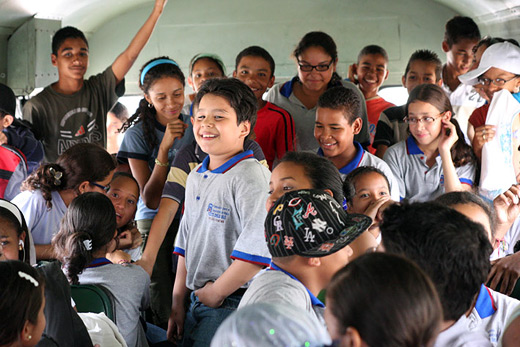
International attention has been drawn to the Venezuelan orchestra system through the national youth orchestra ‘Simon Bolivar’ on concert tours, under the baton of Gustavo Dudamel. The best musicians to emerge from ‘El Sistema’ over the last ten years perform together in this orchestra. The combination of daily rehearsals, instruction by the same professors who teach at the Caracas conservatory, and weekly concerts, have formed an ensemble whose perfectly coordinated teamwork is unique, and which releases a storm of excitement in its audiences worldwide.
The members of the orchestra live in Caracas; their workplace is the Teresa Carreño Theatre. Thanks to the weekly concerts and international tours, and via the orchestra system’s foundation funds, the musicians are able to make a stable living. Those who come from outside the city share apartments that are as close to the theatre as possible so that they are able to get home quickly after the evening concerts. The others live with their parents and must brave the journey to the barrios every Friday evening. Even for the locals, the centre of Caracas and the barrios are absolute no-go areas once darkness falls. Caracas is counted amongst the most dangerous cities in the world. The orchestra system may have changed the young people’s lives, but every day they experience the contrast between the world of music and the reality of their home lives.
Abreu believes in a better future for Venezuela and wants to change people and structures through music. This is an ambitious vision, but he has already achieved important goals. Venezuelans have made classical music their own: it has become part of daily life for children and young adults alike. Throughout the country, the youngest members of society are performing the great symphonies of Western culture, from the expanses of the Grand Sabana to the Cumaná coast, in the Andean highlands in the large cities of Barquisimeto and Caracas. José Antonion Abreu has been awarded the ‘Alternative Nobel Prize’ for his life’s work and has been named Ambassador of the Peace by UNESCO.
Text: Maria Stodtmeier
